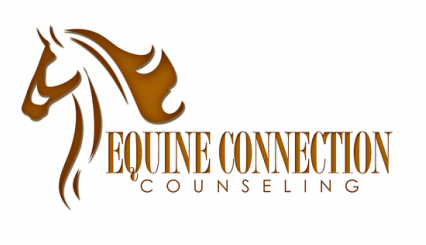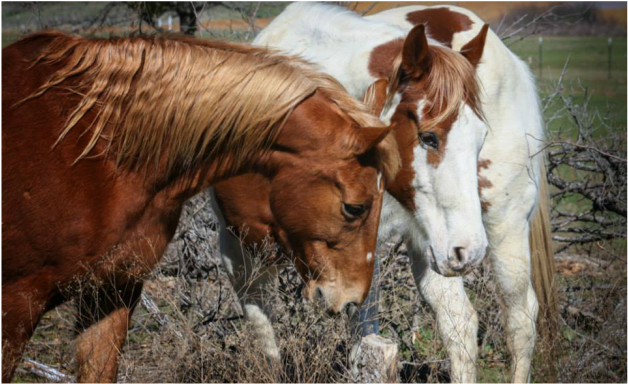1. Horses have the capacity to be self-directed. There are models of EAC that encourage the client to establish dominance over the horse as a way to practice assertiveness, leadership, or communication (think the horse scene in the movie 28 Days). In REPC, we view the horse not as a thing to be controlled or influenced, but rather as a sentient participant whose actions, reactions, and experiences are just as valuable to the therapeutic process as the client's and counselor's are. Most of the time our horses are at liberty in their own pastures and can choose what they do or do not want to participate in during session. If a horse chooses to follow a client around the pasture, they do. If a horse wants to walk away from a client, they do. If multiple horses want to approach a client during an emotionally charged moment (it's happened!), they do. The horse has the opportunity to freely express his or her reactions to clients genuinely and authentically. REPC respects the horse's autonomy in terms of behavior and feeling. This can be very different from other equestrian activities in which horses are trained to do as a human asks and act according to human expectations. REPC gives horses the opportunity to have a say (and be in heard) in communicating what they want (or don't want) from their interaction with clients. Clients are encouraged to approach the horse as someone they are in a relationship with (much like our spouses, children, coworkers, teachers, etc). This approach enables both the horse and client to strive towards collaboration, compromise, and mutual understanding - all the ingredients of a healthy relationship.
2. Structured activities are de-emphasized and session content is allowed to develop organically. Some forms of EAC rely on specifically structured exercises that work with the horse as a metaphor for life's challenges. Others have a step-by-step course of activities designed to encourage the client's assertiveness and problem solving skills. Because REPC is relationship-focused, clients may develop skills in all the things listed above, but the goal is to develop insight and emotional regulation as opposed to completing an activity. For therapy horses, this can make every day new and different. Horses that work mostly in an arena with riders on their backs can become bored and irritated with their job just like people do (imagine going to work to perform the same exact tasks over and over every day). The organic, adaptable nature of REPC can provide mental stimulation and keep horses from getting bored. The certified equine specialists that co-facilitate EAC sessions with the ECC counselors also work with our partner Wings of Hope's riding program. Many of them have shared seeing positive changes in horses' stress levels and behaviors in riding lessons since they began partnering with ECC.
3. All sessions are conducted on the ground. With riding and other strenuous physical activity off the table, there are many horses that might otherwise be simply "put out to pasture" that can continue to work and be interactive. For example, ECC works with horses owned by our partner organization, Wings of Hope, which offers therapeutic riding lessons. Horses that work in their riding program must be calm, physically sound, and difficult to scare or upset. Our partnership has given new purpose to horses that have become unsuitable for that work--for example, older horses with physical problems that make riding them unsafe. By partnering with ECC for the counseling program, the horses can remain at their caring home and Wings of Hope can be confident that these special horses continue to do what they do best: support the growth and healing of those working to overcome life's challenges.
*The world of equine assisted counseling is growing and developing quickly. The variety of methods and modalities gives practitioners a lot of control over their practice and clients a lot of choice in how to approach the healing process. While those of us at ECC are a little biased--alright, a lot biased--towards REPC, we always encourage therapists and equine professionals interested in getting involved with EAC to find the approach that fits for them. We are always excited to offer consultation and training to professionals seeking to enter the industry.*
What other benefits do you think EAC/REPC might have for horses? If you are already involved in the EAC field, what changes have you noticed in the horses you work with since beginning your practice?


 RSS Feed
RSS Feed
